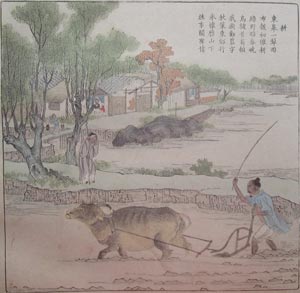|
T of C
Home |
My Work |
Hand- books |
Qin as Object |
Qin in Art |
Poetry / Song |
Hear, Watch |
Play Qin |
Analysis | History |
Ideo- logy |
Miscel- lanea |
More Info |
Personal | email me search me |
| FXXP / ToC | 聽錄音 Listen to my recording with lyrics / 首頁 |
|
33. Return to Plowing
- grouped under shang mode, but more like jue mode2 |
歸耕
Gui Geng 1 Plowing for parents 3 |
 Zengzi Gui Geng is #13 of the 21 miscellaneous songs attributed to Cai Yong, but as a qin melody Gui Geng survives only in Fengxuan Xuanpin.4 The theme of the song is filial duties, with the mention of plowing seeming to be a reference to these duties.5
Zengzi Gui Geng is #13 of the 21 miscellaneous songs attributed to Cai Yong, but as a qin melody Gui Geng survives only in Fengxuan Xuanpin.4 The theme of the song is filial duties, with the mention of plowing seeming to be a reference to these duties.5
Zengzi (Zeng Shen, 505-436), a disciple of Confucius particularly famous for his filial piety, was also known for living a simple life of poverty.
Gui Geng in Fengxuan Xuanpin is a short song; a tentative translation of the lyrics is included below. These lyrics are first set to a melody in harmonics, then are repeated with essentially the same melody in stopped and open sounds; there is no harmonic closing.
Reconstruction of this melody was complicated by several discrepancies in the lyrics as well as some obvious errors in the tablature; these were solved mainly by assuming that the repetition of the melody was intended to be the same as its original statement.6
None
00.00 (Melody of the first phrase, added here without lyrics as a prelude)
A tentative translation of the lyrics is as follows:7
往而不返者年也,不可得而再事者親也。
枯魚在橐,何日得蠹(睹),
二親再堂,為幾日客。
再作 When repeating the lyrics to the different melody, 蠹 dù is changed to 睹 dǔ (further below).
1.
Gui Geng (Return to Ploughing) references (II/152)
Zha's Guide (also below) also quotes some related lyrics. (Note that "plowing" is also spelled "ploughing".)
2.
Shang Mode (商調 shangdiao)?
3.
Plowing for the parents
4.
Tracing Gui Geng
5.
Plowing
6.
Errors
7.
Lyrics
The opening two lines of these lyrics are slightly different from two phrases in 韓詩外傳,卷九 Folio 9/3 of the Hanshi Waizhuan
(ICTCL, p.312: Han Ying's Illustrations of the Didactic Application of the Classic of Songs; China Text Project), which are as follows (Confucius speaks, quoting his disciple 皋魚 Gao Yu),
This is paraphrased in the biography of 張衡
Zhang Heng in the 後漢書 History of the Latter Han as follows:
The closing two lines have one character different in each version. Their source is not clear:
Translations incomplete.
Return to the annotated handbook list
or to the Guqin ToC.
Original preface
Music and lyrics (看五線譜 transcription; 聽錄音 timings follow my recording)
Not divided into sections, but the lyrics are played in harmonics, then repeated once in open and stopped sounds. For my recording the timings are:
00.12 (Section One: lyrics set to melody in harmonics - completely syllabic setting)
01.22 (Section Two: lyrics repeated, set to same melody [plus 3 or four ornamental notes] but not in harmonics)
02.29 (End)
Shù yù jìng ér fēng bù xī, zi yù yǎng ér qīn bù dài.
Trees prefer quiet but the wind does not cease;
children like to provide nurture but with parents one cannot wait.
Wǎng ér bù fǎn zhě nián yě, bù kě dé ér zài shì zhě qīn yě.
They pass away and never return, like the years;
It is unbearable that we cannot once again serve our parents.
Kū yú zài tuó, hé rì dé dù (dǔ),
Fish out of water are in sacks, when can they gaze (at their worms?)
Èr qīn zài táng, wèi jǐ rì kè.
With both parents in the reception hall, daily one can visit (?).
Footnotes (Shorthand references are explained on a
separate page)
16714.144/1 retire from official life; /2 a qin melody by 曾子
Zengzi. The latter references a footnote to the biography of 張衡
Zhang Heng in the 後漢書 History of the Latter Han, quoting some lyrics that are related to but somewhat different from those here (see below).
(Return)
Although grouped with shang mode melodies it has does not seem to have standard shang mode characteristics (see
Shenpin Shang Yi), being more like jue mode melodies (角調 jiaodiao; see
Shenpin Jiao Yi). Specifically, gong (do) seems to be the tone of the open third string, and four of the eight phrases in each section end on the note jue (mi). See also Modality in Early Ming Qin Tablature.
(Return)
This image is from Images of Agriculture and Sericulture (耕織圖 Geng Zhi Tu), a reprint of the Imperially Commissioned Illustrations of Agriculture and Sericulture (御製耕織圖 Yuzhi Geng Zhi Tu), originally published in 1696 in imitation of 12th century originals.
(Return)
Zha's Guide 16/163/362. Page 163 has several commentaries from other sources, not from qinpu.
(Return)
See also Plowman's Song
(Return)
In the section that repeats the text, two characters (再 and 蠹, the latter perhaps a mistake) are omitted and the second 親 is changed to 觀. In addition some of the tablature in this section is not playable as written (items unclear or impossible to play); in other places changes to the melody are questionable (e.g., writing position 六七, where 六上 would give same note as in the harmonic section).
(Return)
The original lyrics are as follows:
往而不返者年也,不可得而再事者親也。
枯魚在橐,何日得(蠹)睹,
二親再堂,為幾日客。
(Repeat)
往而不可〔追者,年也,去而不可〕得見者、親也。
歔欷歸耕來兮。安所耕?
歷山盤兮(嶔崟)。
二親在堂,為幾日客。
(Return)